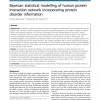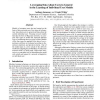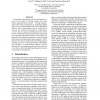1636 search results - page 56 / 328 » Using Bayesian Networks to Model Agent Relationships |
103
click to vote
ATAL
2010
Springer
15 years 3 months ago
2010
Springer
Most agent-based modeling techniques generate only a single trajectory in each run, greatly undersampling the space of possible trajectories. Swarming agents can explore a great m...
125
click to vote
BMCBI
2010
15 years 2 months ago
2010
Background: We present a statistical method of analysis of biological networks based on the exponential random graph model, namely p2-model, as opposed to previous descriptive app...
IJCAI
2001
15 years 3 months ago
2001
Models of computer users that are learned on the basis of data can make use of two types of information: data about users in general and data about the current individual user. Fo...
128
click to vote
NECO
2002
15 years 2 months ago
2002
In this work, we discuss practical methods for the assessment, comparison, and selection of complex hierarchical Bayesian models. A natural way to assess the goodness of the model...
147
click to vote
COOPIS
1995
IEEE
15 years 6 months ago
1995
IEEE
Increasingly, information systems development occurs in the context of existing systems and established organizational processes. Viewing organizational and system components as c...



